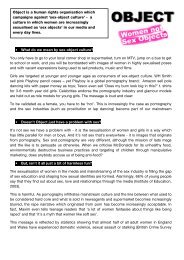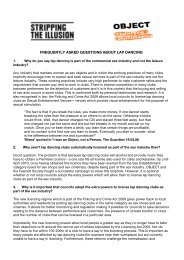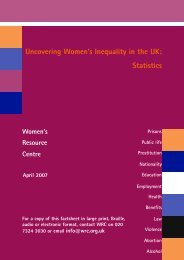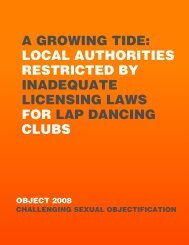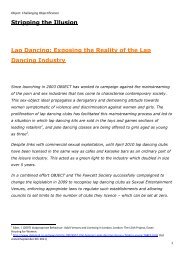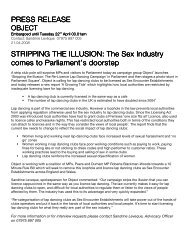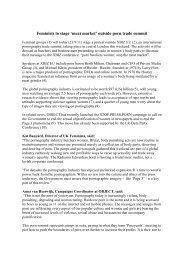FREQUENTLY ASKED QUESTIONS ABOUT LAP DANCING - Object
FREQUENTLY ASKED QUESTIONS ABOUT LAP DANCING - Object
FREQUENTLY ASKED QUESTIONS ABOUT LAP DANCING - Object
Create successful ePaper yourself
Turn your PDF publications into a flip-book with our unique Google optimized e-Paper software.
Lap dancing clubs encourage their customers, and wider society to see women as sex objects. They<br />
reinforce the idea that women are always sexually available, as long as you’ve got a bit of cash to spare.<br />
This has to be seen in the wider context of a society in which men still dominate the positions of power<br />
and where violence against women is endemic, with 1 in 4 women facing rape in her lifetime and 1 in 2<br />
women facing sexual harassment, stalking or domestic violence. Those working with female victims of<br />
male violence believe that the mainstreaming of the sex industries legitimises the attitudes that<br />
ultimately lead to violence against women.<br />
The fact that we are bombarded with sexist images of women in poses which stem from pornography,<br />
depicting women as always up for sex, no matter what, cannot be disconnected from endemic violence<br />
against women, low conviction rates, and the fact that the majority of people still think that women are<br />
at least partly to blame if they are sexually assaulted (Amnesty International, Sexual Assault Research<br />
2005). For something to be harmless it would need to be proven that it has no effect whatsoever on<br />
these worrying statistics. Can you say with confidence that this is the case?<br />
“The use of women in degrading entertainment exacerbates violence against women…lap dancing and similar clubs be regulated to<br />
ensure that local crimes against women do not increase” Women’s National Commission (WNC) report to the UN Commission on the<br />
Elimination of Discrimination Against Women (CEDAW) 2005<br />
5. But isn’t lap dancing empowering for women?<br />
What kind of power are we talking about? Can sexual power get you equal pay, equal representation<br />
and an equal voice? You also have to look at why lap-dancing is seen as empowering. Why is it that in<br />
our society stripping off and posing to satisfy men is a key way we’re told to empower ourselves? The<br />
porn industry has saturated mainstream culture so much that what is essentially a sexist and<br />
exploitative industry is now seen as ‘normal’ and ‘empowering’. How can an industry which makes huge<br />
profits from manipulating men and sexually objectifying women be empowering?<br />
The power relations inside lap dancing clubs aren’t that simple either. Of course not every experience is<br />
the same, but if women have all the power in lap dancing clubs why do so men admit that it is not just<br />
sexual titillation which keeps them coming to clubs but the power trip that they get from paying a<br />
performer to strip for them?<br />
“Lap dancing is about creating a situation whereby the men feel they are doing you a favour - that's the way the game is set up, so all the<br />
power is with the customer … [she believes that] for men who visit lap dancing clubs, enjoyment derives primarily from handing over the<br />
money, not from the dance itself” ‘Elena’ quoted in ‘I was an <strong>Object</strong>, not a Person, The Guardian 19.03.08<br />
6. Aren’t you being prudish in having a problem with the sex industry and lap dancing?<br />
Just like we don’t accuse anti-McDonalds protestors of being ‘anti-food’, challenging the normalisation<br />
of the sex industry doesn’t mean you have a problem with sex! We don’t have a problem with nudity, we<br />
have a problem with how the mainstreaming of lap dancing clubs reinforces the idea that a woman can<br />
be bought and sold to provide sexual services of some kind.<br />
Recent research into men who buy sex in East London 3 highlighted that men were put off from sexually<br />
exploiting women when they started considering them as people. Viewing women as people and not as<br />
objects is a crucial step in changing attitudes. Challenging lap dancing is not about challenging sexual<br />
expression, it is about pointing out the danger of continuing to represent women as sex objects who are<br />
always gagging for it in a culture in which sexual violence is so common.<br />
“The lack of respect paid to women who sell sex was evident in the negative and derogatory attitude of some of the buyers. Perhaps<br />
most interesting was the suggestion in one interview that viewing women as people was itself a deterrent. This illustrates conclusively that<br />
men can and do change their attitudes towards buying sex and a key avenue to achieve this is through recognition of women’s<br />
subjectivity and the contributions men (even as individuals) can make to reducing gender inequality. Coy, Kelly and Horvath (2007) It’s just<br />
like going to the supermarket: Men buying sex in East London Report for Safe Exit<br />
2



